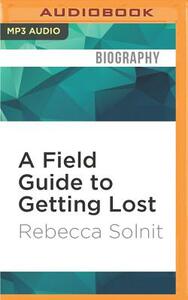Take a photo of a barcode or cover
adventurous
challenging
emotional
inspiring
reflective
fast-paced
challenging
inspiring
reflective
slow-paced
Beautiful essays on the transformative experience of loss and being lost. Really thoughtful and cleverly expresse, but they do need concentration. I really enjoyed this and will come back to it, particularly 'The Blue of Distance' sections.
informative
reflective
relaxing
slow-paced
Heel mooi boek over verdwalen en het nut van verdwalen in deze tijd waarin alles gericht is. Solnit schrijft (zoals altijd) met prachtige analyses die sterk worden onderbouwd door eigen verhalen en ervaringen als goede wetenschappelijke artikelen/verhalen van anderen. Ze duikt in het boek zelf ook in een soort verdwaalmodus af en toe en dat is mooi en past bij het concept. Staan hele mooie passages in, soms vond ik het ietwat te Amerikaans, romantisch of overdreven geschreven maar dat hoort erbij.
Pretty good book, seems to really fall apart in the last chapter. There's no real conclusion, maybe that's the point in a book about getting lost. If so, it was beyond me.
informative
inspiring
reflective
relaxing
slow-paced
“Leave the door open for the unknown, the door into the dark. That’s where the most important things come from…”
— Rebecca Solnit, A Field Guide to Getting Lost
— Rebecca Solnit, A Field Guide to Getting Lost
In A Field Guide to Getting Lost, Rebecca Solnit crafts a luminous, searching meditation on what it means to stray from the path—whether in nature, relationships, art, or identity. It is a book that gently defies categorization, part memoir, part cultural history, part philosophical inquiry. Solnit invites us to not only tolerate uncertainty, but to embrace it, even welcome it. Getting lost, she argues, is not a failure of direction—it’s a necessary condition for discovery.
The book meanders, yes—but that’s entirely the point. Like a long, winding hike through unfamiliar terrain, A Field Guide to Getting Lost isn't interested in taking you straight to a destination. It’s about everything you encounter along the way. Solnit moves fluidly from personal memories to Renaissance painters, from the deserts of the American West to the blue of Yves Klein’s art, weaving connections that feel intuitive rather than linear. The result is a reading experience that feels more like following a stream than reading a map.
Her writing is rich, lyrical, and introspective. You don’t read Solnit so much as you dwell in her words. She doesn’t push answers; she opens doors. In a world increasingly obsessed with control and certainty, her work offers a gentle, radical counterpoint: what if being lost is how we truly find ourselves?
A Field Guide to Getting Lost is a book to carry with you—figuratively and literally—as you navigate the unknowns in life. It lingers long after the last page, reminding you that the detours, the wrong turns, and the pauses to look around are often where the most meaningful parts of the journey reside.
emotional
inspiring
reflective
slow-paced
Loved the concept. Really liked specific chapters. For me it was a little to broadly written. I was hoping for something more specific
The process of transformation consists almost entirely of decay ✨
reflective
medium-paced
The book is thought provoking and helps you to consider what we know, what we don't know and what we know and chose to unknow.




